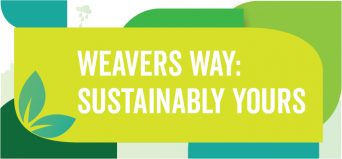
Recycling Isn't What It Used To Be

You might be thinking that recycling is just putting your plastic, cans and paper in a bin. These days, it isn’t.
Ever since China announced stricter requirements for processing recycled material, much of our “recycling” actually goes to the landfill. “All of a sudden, material being collected on the street doesn’t have a place to go,” said Peter Keller, VP of Republic Services, a large waste-disposal company.
Exports of scrap plastic to China are down 90 percent. Waste companies that used to get paid for recycled materials; now they have to pay to have them taken away. In rural areas where it’s harder to find markets, some recycling trucks are driving straight to the dump. Worse, unwashed or non-recyclable items, like plastic-lined paper cups, can contaminate an entire load, reducing or even eliminating its value on the market.
It’s better to avoid plastic or single-use items altogether.
Meanwhile, although I still can’t resist picking up a discarded plastic bottle and putting it a recycling bin, my focus is on green waste. Everywhere I go, I see plastic garbage bags filled with leaves and weeds from folks “cleaning” their gardens. Some may think that their trash service handles these random “compostables,” but chances are very good they just go in the truck with the rest of the trash.
And just because you put garden waste in paper lawn-waste bags doesn’t mean they will be recycled. In Philadelphia, those bags go to the landfill unless you take them to designated sites on particular dates during leaf-pickup season. Year-round, you can take them to the Streets Department recycling center on Domino Lane in Roxborough, or to the Recycling Center at 3850 Ford Road in West Fairmount Park.
One reason I advocate for keeping yard waste out of the trash is it produces methane in the ideal anaerobic condition that landfills offer. As bad as carbon dioxide is, methane is far worse, at least 28 times more potent than carbon dioxide as a greenhouse gas.
Landfills are the third greatest source of human-related methane emissions in the United States. The U.S. had the highest amount of methane from landfills in the world in 2010, according to the Global Methane Initiative (www.globalmethane.org). By 2014, we had 148 million metric tons, despite 652 landfill methane capture facilities, which divert some of the methane for energy.
That should be enough to convince you to avoid putting food and garden waste into the landfill.
Most important is not to waste food — the Natural Resources Defense Council (www.nrdc.org) estimates that 40 percent of food is left uneaten — but if you must, try to compost. Some cities offer curbside composting. Philadelphia is trying; it has a goal to become a zero-waste city by 2035. “Setting a zero-waste goal without having organic diversion is inconceivable,” said Philadelphia’s Zero Waste and Litter Director Nic Esposito. The most recent study, in 2010, estimated that 12 percent of Philadelphia’s garbage is yard waste and 13 percent food and organic matter.
The city is also is promoting in-sink garbage disposals. A pilot project that installed 173 garbage disposals found that after one year, most households significantly reduced their food waste. Now all new residential buildings must have garbage disposals. “Food is 70 percent water, on average, so if you grind up food it just flows with the water,” said Paul Kohl of the Water Department. Wastewater treatment plants have anaerobic digesters; the microorganisms break down the organic material.
Electronics recycling is different. Electronics contain precious metals, some of which are highly toxic (but also valuable and reusable). So DO recycle electronics responsibly — it’s critical to prevent these toxic materials from filling landfills or being sent to third-world countries where poor people are exposed to them.
Thank you for any attempt you make to reduce methane emissions by composting and giving your leaves and weeds a place in your yard to decompose. The Earth thanks you too.
